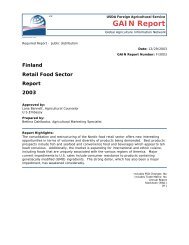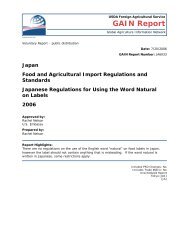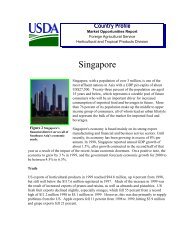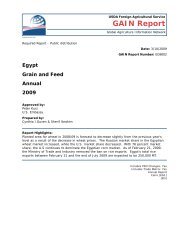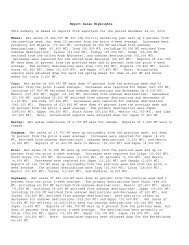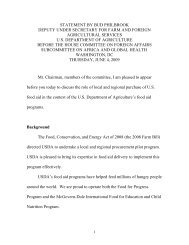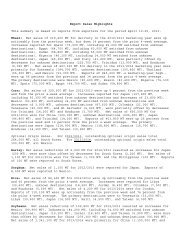GAIN Report - Foreign Agricultural Service
GAIN Report - Foreign Agricultural Service
GAIN Report - Foreign Agricultural Service
Create successful ePaper yourself
Turn your PDF publications into a flip-book with our unique Google optimized e-Paper software.
Voluntary <strong>Report</strong> - public distribution<br />
KS3035<br />
Korea, Republic of<br />
Organic Products<br />
Date: 7/14/2003<br />
<strong>GAIN</strong> <strong>Report</strong> Number: KS3035<br />
What is Needed When Exporting Organic Products<br />
to South Korea?<br />
2003<br />
Approved by:<br />
Daryl Brehm<br />
U.S. Embassy<br />
Prepared by:<br />
Robert Morgan<br />
USDA <strong>Foreign</strong> <strong>Agricultural</strong> <strong>Service</strong><br />
<strong>GAIN</strong> <strong>Report</strong><br />
Global Agriculture Information Network<br />
<strong>Report</strong> Highlights:<br />
The labeling requirements for processed organic products imported by Korea have been<br />
updated to more closely parallel organic labeling requirements in the U.S. In order to clear<br />
Korean customs, however, U.S. exporters of processed organic foods need to make certain<br />
that all required documentation accompanies their products. Regulations for fresh products<br />
are administered under a separate program overseen by a different regulatory body.<br />
Includes PSD Changes: No<br />
Includes Trade Matrix: Yes<br />
Unscheduled <strong>Report</strong><br />
Seoul [KS1]<br />
[KS]
<strong>GAIN</strong> <strong>Report</strong> - KS3035 Page 2 of 5<br />
Certification<br />
The Korean Food and Drug Administration (KFDA) regulates the labeling of processed organic<br />
food products. An USDA/AMS-accredited certifying agent must certify and provide a<br />
transaction certificate for processed organic products for export to Korea. Additional Korean<br />
certification is unnecessary because the KFDA will recognize the USDA certificate.<br />
The Ministry of Agriculture and Forestry (MAF) regulates imports of fresh produce and does<br />
not recognize USDA accredited certifying agents. However, USDA accredited certifying<br />
agents—or any other certifying agent—may apply for MAF recognition. Once recognized by<br />
MAF, any certifying agent can issue organic certifications for unprocessed organic products.<br />
The costs of Korea-specific requirements, combined with the high cost of the air shipping<br />
often necessary for perishable produce, has discouraged US fresh organic exports to Korea.<br />
This report, therefore, focuses on the requirements for labeling processed organic products<br />
for the Korean market. See the table below for a brief summary of the Korean labeling<br />
requirements for fresh organic products.<br />
Labeling<br />
Korean labeling requirements for processed organic foods have been modified recently to<br />
parallel US Organic labeling requirements. They are the following:<br />
100% Organic- This claim may only be used on the label if all ingredients<br />
contained in the product are certified organic.<br />
Organic (on main label)- More than 95% of the product’s ingredients must be<br />
certified organic in order to print “organic” on the main product label. The<br />
percentage of each organic ingredient must be stated on the ingredient panel<br />
of the Korean language label.<br />
Organic (not displayed on main product label)- This is the equivalent to the US<br />
labeling standard “made with organic.” If 70-95% of the product’s ingredients<br />
are organic, the organic claim can be made somewhere not on the main<br />
product label. The percentage of each organic ingredient must also be stated<br />
and the same ingredient cannot be sourced from both organic and non-organic<br />
sources.<br />
Listing- Products containing less than 70% organic content can list the<br />
percentage of each organic ingredient in the ingredients statement. However,<br />
an accredited certifying agent must certify that the final product was<br />
manufactured with the organic ingredient stated on the ingredient panel.<br />
Several shipments of U.S. product containing organic ingredients but<br />
unaccompanied by an organic certificate have failed to clear Korean customs.<br />
The same organic label used in the US can now be used for export to Korea, but the importer<br />
must provide the documentation listed below. If the English language label is used, the<br />
importer is required to apply a Korean language sticker. If the Korean language sticker does<br />
not state the product is organic, or if the importer lacks a transaction certificate issued by a<br />
USDA/AMS accredited certification agent, the product may be sold as non-organic if the<br />
organic claim on the English label and ingredient panel is deleted or covered.<br />
UNCLASSIFIED USDA <strong>Foreign</strong> <strong>Agricultural</strong> <strong>Service</strong>
<strong>GAIN</strong> <strong>Report</strong> - KS3035 Page 3 of 5<br />
Documentation Needed<br />
The US exporter should include the following documentation for the importer in Korea:<br />
Original Transaction Certificate- An original transaction certificate (not a copy)<br />
issued by an USDA/AMS accredited certifying agent must state the final<br />
product lot is organic, including the lot number, volume, etc…<br />
Organic Certificate- Although not specifically required by KFDA, some KFDA<br />
port inspectors may mistakenly think it is needed. Therefore, if available,<br />
including a copy of the organic certificate issued to the U.S. organic producer<br />
or handler by an USDA/AMS accredited certifying agent may expedite the port<br />
clearance process.<br />
Problems may also be avoided if the importer includes copies of both the<br />
Original Transaction Certificate and the Organic Certificate with the product<br />
when it is distributed to wholesalers and retailers.<br />
In the past, importers often needed a copy of the AMS home page and<br />
accompanying pages listing USDA/AMS accredited organic certifying bodies.<br />
KFDA has now added a link to a list of USDA/AMS accredited agents on their<br />
agency website. The printed pages are no longer required.<br />
U.S. and Korean Organic Regulations Compared<br />
The table below provides a side-by-side comparison of the U.S. and Korean organic<br />
certification and labeling requirements. Note that although Korea’s standards for labeling<br />
organic products now more closely resemble those in the U.S. system, small differences<br />
remain.<br />
Organic Labeling Requirements for Imports: The United States and Korea<br />
US requirements Korean Requirements<br />
Certification for Must be certified organic Imports from the U.S.<br />
Processed Products by USDA accredited agent. need certificate issued by<br />
Agent can be state, an USDA/<strong>Agricultural</strong><br />
private, or foreign. Marketing <strong>Service</strong> (AMS)<br />
accredited certifying agent.<br />
See <strong>GAIN</strong> report KS3034<br />
for more detail.<br />
An “original transaction<br />
certificate” issued by an<br />
USDA/AMS accredited<br />
certifying agent stating lot<br />
is organic (including lot #,<br />
product name, volume,<br />
etc…)<br />
Customs has sometimes<br />
asked for an original farm<br />
or plant certificate, but it is<br />
not a requirement if an<br />
“original transaction<br />
certificate” is provided.<br />
UNCLASSIFIED USDA <strong>Foreign</strong> <strong>Agricultural</strong> <strong>Service</strong>
<strong>GAIN</strong> <strong>Report</strong> - KS3035 Page 4 of 5<br />
Labeling of Processed<br />
Organic Products<br />
100% Organic<br />
Organic<br />
Made With Organic<br />
(US)/”Organic” (Korea)<br />
Listing on Ingredient Panel<br />
Fresh Organic Labeling<br />
Requirements<br />
“Organic Product”<br />
(green label)<br />
“Transitional Organic<br />
<strong>Agricultural</strong> Product”<br />
(light green label)<br />
“No <strong>Agricultural</strong><br />
Chemicals”<br />
(blue label)<br />
May be used on main label<br />
only if all ingredients are<br />
organic<br />
95% of product by weight<br />
must be organic in order to<br />
print “organic” on main<br />
product label. Remaining<br />
5% may be non-<br />
agricultural substances<br />
from approved list.<br />
At least 70-95% of<br />
ingredients must be<br />
organic to include “Made<br />
With Organic” on the main<br />
label. Up to three organic<br />
ingredients can be named.<br />
Same ingredient can’t be<br />
sourced from organic and<br />
non-organic sources.<br />
No GMOs, irradiation, or<br />
sewage sludge used in<br />
production or handling.<br />
Products with less than<br />
70% organic content can<br />
list those ingredients that<br />
are organic on ingredient<br />
panel, but can’t say<br />
“organic” on main label<br />
display panel.<br />
The US system for labeling<br />
unprocessed organic<br />
products is the same as<br />
the system used for<br />
labeling processed<br />
products.<br />
Same<br />
US standards accepted,<br />
but the percentages of all<br />
organic ingredients should<br />
be listed on the Korean<br />
Language label. “Organic”<br />
can be used as a part of<br />
the product’s name.<br />
The standard is the same,<br />
but “organic” cannot be<br />
stated anywhere on the<br />
main label in Korean. The<br />
U.S. label stating “made<br />
with organic” in English<br />
may be used provided that<br />
the Korean language<br />
sticker on the main panel<br />
does not say “organic” on<br />
it. Percentages of organic<br />
ingredients need to be<br />
listed on the Korean<br />
language ingredient label.<br />
Percentages of organic<br />
ingredients need to be<br />
listed on the Korean<br />
language ingredient label.<br />
Organic farms must be<br />
certified by a Korean<br />
Ministry of Agriculture and<br />
Forestry (MAF) approved<br />
certifying organization.<br />
Farm must be chemical<br />
free for 3 years.<br />
Farm must be chemical<br />
free for at least one year<br />
but less than three.<br />
No agricultural chemicals,<br />
but levels of chemical<br />
fertilizer allowed within the<br />
UNCLASSIFIED USDA <strong>Foreign</strong> <strong>Agricultural</strong> <strong>Service</strong>
<strong>GAIN</strong> <strong>Report</strong> - KS3035 Page 5 of 5<br />
“Low <strong>Agricultural</strong><br />
Chemicals”<br />
(orange label)<br />
UNCLASSIFIED USDA <strong>Foreign</strong> <strong>Agricultural</strong> <strong>Service</strong><br />
law.<br />
Produced with ½ or less<br />
the amount of agricultural<br />
chemicals allowed by law.



